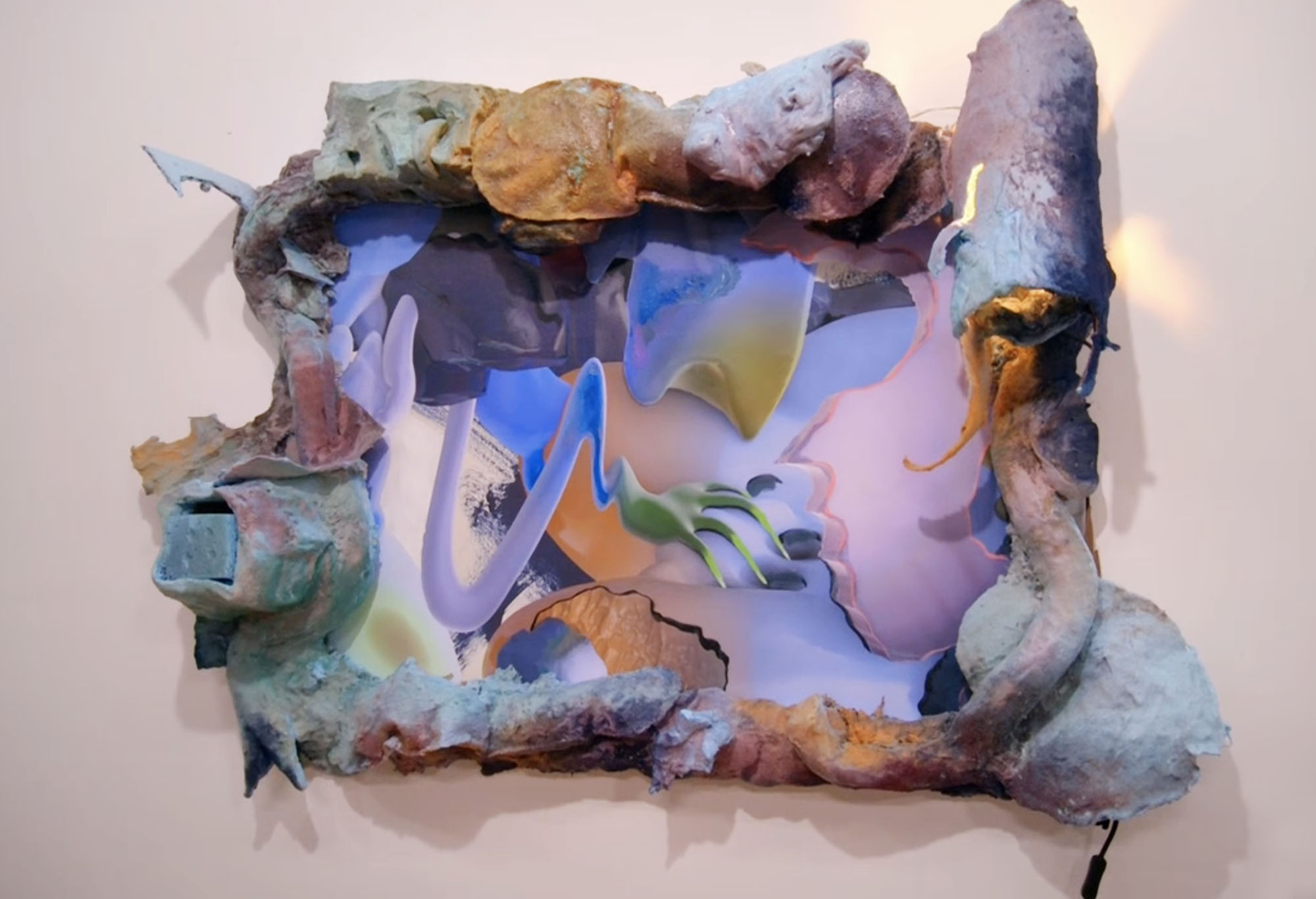
We’re at the penultimate episode of The Exhibit, the reality competition by MTV and Hirshhorn to unearth America’s next great artist, which has set a futuristic task for its contestants. This week’s commission asks the seven competing artists to revisit a work they’ve previously created, and update or evolve it with an eye to the future. You know, it’s sort of like how George Lucas revisited the original Star Wars 30 years on to add random CGI rocks.
If anything, such a brief invites conceptualization—which means it’s finally time for our resident conceptualist, Jillian Mayer, to shine. Mayer has yet to win a commission for work that’s often been big in ideas but low in execution, but this week, she’s set on “homing in on the mess and pushing the idea through.”
Jillian Mayer at work on her installation. Photo: Screenshot from The Exhibit, episode five.
She’s looking back at her deeply weird 2011 video work, I Am Your Grandma, in which she presented an older version of herself leaving behind a “digital heirloom” for her grandchildren. In her new piece, that same protagonist has rejected that manner of tech optimism, swapping it for a grim prepper’s bunker—an “unhinged” installation Mayer has created as a “full world buildout” complete with a song, piped through an iPhone, that goes, “Free yourself / Delete yourself.”
Technological terror also runs through Jennifer Warren’s painting, which is based on an older canvas titled Cool Facade, featuring a “freeform exploration of a screaming face.” Her new screaming face, less freeform and looking more like a prog rock album cover, is intended to express frustration in the face of technology.
“The more we get into the digital world,” she explained, “I think the more people want to get out of it and come back to real life.”
Jennifer Warren at work on her painting. Photo: Screenshot from The Exhibit, episode five.
Meanwhile, Jamaal Barber is evolving his past work, titled Big Mama, to be less a portrait of mourning and more of celebration. Misha Kahn is responding to a claymation video he created as a child by transporting those sculptures into VR. His eventual VR collage will be encased in a 3D frame sculpted out of sponge, which takes up so much production time he had to recruit Warren and Barber to help add the last painterly touches to the canvas itself.
Other works, however, don’t quite respond to the prompt as meaningfully. Frank Buffalo Hyde is revisiting his 2011 painting, We Don’t Pray Like They Do, which juxtaposed Native American dancers with technological playthings, by simply making a similar painting with newer technological playthings. Clare Khambu is expanding her older work, a painting titled Exit, with an installation of painted circles and circle cutouts meant to encourage viewers to “note the passing of time.”
Detail of Baseera Khan’s Painful Arc, Shoulder (2023). Photo: Screenshot from The Exhibit, episode five.
Baseera Khan is creating a mixed media work to depict a flesh-like material squished between two plexiglass panes, a material they’re pulling from their previous installation, Air Duct. The sculpture captures their struggles with a cyst growing in their left ovary and their feelings of “being pushed up against a wall,” which is a brave undertaking, but doesn’t actually answer the brief.
So, come on, Mayer has this one locked down. The judging panel—made up this week of series judge Melissa Chiu, linebacker-turned-art collector Keith Rivers, and artists Kenny Schachter and Abigail DeVille—give marks to works by Kahn (“He’s brought it all together,” said Chiu) and Barber (whose canvas “gives us optimism for the future,” per DeVille). But it’s Mayer’s complex installation that wins the episode.
Jillian Mayer, Untitled (2023). Photo: Screenshot from The Exhibit, episode five.
“Every time you go back to that work, you find something new,” said Chiu.
“Contemporary art is a reflection of our social, political, and economic times,” Schachter said to Mayer, “and in that sense, you did a perfect expression of the moment we’re in with a view toward tomorrow.”
Are the judges finally catching the “vibe” she’s trying to build in her projects? Mayer hopes so, “especially since I made the ugliest work out of everyone.” She added: “My work was nuts. It was mayhem.” Or maybe, it looks like the future.